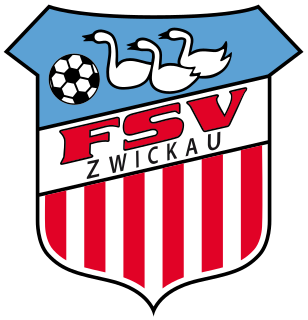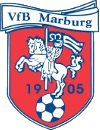 | |||
| Full name | Ballspiel-Club Hartha e.V. | ||
|---|---|---|---|
| Founded | 1913 | ||
| League | Kreisliga A Muldental-Süd (IX) | ||
| 2015–16 | 3rd | ||
BC Hartha is a German association football club from the town of Hartha, Saxony.
 | |||
| Full name | Ballspiel-Club Hartha e.V. | ||
|---|---|---|---|
| Founded | 1913 | ||
| League | Kreisliga A Muldental-Süd (IX) | ||
| 2015–16 | 3rd | ||
BC Hartha is a German association football club from the town of Hartha, Saxony.
The club was established 13 July 1913 and first emerged from local level competition in the mid-1930s by capturing the Bezirksklasse Mittelsachsen (II) title in 1935 and then winning a promotion playoff to advance to the Gauliga Sachsen, one of sixteen regional top-flight divisions established in the 1933 re-organization of German football under the Third Reich. Hartha fielded competitive sides through the balance of the decade and on to the end of World War II in 1945. The team captured division titles in 1937 and 1938 and delivered a number of top three finishes. Those titles earned BC a place in the national playoffs, but they were unable to progress beyond the opening group stage. They also made appearances in play for the Tschammerpokal, predecessor to today's DFB-Pokal (German Cup), in 1935–39 and 1941, and sent a representative to the national team in 1939. [1]
They slipped briefly from first division competition in 1941 but returned after just a single season absence. As the war overtook the country, play became more local in character and in 1944 BC became part of the Gauliga Chemnitz which collapsed early in the 1944–45 season.
Following the war the former membership of BC was re-formed as Sportgemeinde Hartha which became part of the separate football competition that emerged in East Germany. The team was renamed BSG Industrie Hartha in 1949 and again in 1952 as BSG Fortschritt Hartha. From 1953 until 1958, BSG was part of the second tier DDR-Liga before slipping to the Bezirksliga Leipzig, where they played as an anonymous lower division side over the next three decades. On 18 August 1990, as the reunification of Germany approached, the club reassumed its traditional identity as BC Hartha.
The club has been playing in the lower amateur leagues in its recent history, competing in the tier nine Kreisliga A since 2013. [2] [3]

Dresdner Sportclub 1898 e.V., known simply as Dresdner SC, is a German multisport club playing in Dresden, Saxony. Founded on 30 April 1898, the club was a founding member of the German Football Association in 1900. The origins of the club go back still further to the predecessor side Dresden English Football Club formed in 1874 by expatriate Englishmen as Germany's first football club and possibly the earliest in continental Europe: Dresdener SC was organized by one-time German members of the EFC.

TuS Koblenz is a German association football club, located in Koblenz, Rhineland-Palatinate. Fussball Club Deutschland Neuendorf, which was formed in 1911, is viewed as the foundation of the modern club.
BSG Stahl Riesa is a German association football club from Riesa in Saxony.

SV Dessau 05 is a German association football club based in Dessau, Saxony-Anhalt. They distinguished themselves in 1949 as winners of the inaugural FDGB-Pokal, the East German Cup.

FSV Zwickau is a German association football club located in Zwickau, Saxony. Today's club claims as part of its complex heritage sides that were East Germany's first champions: 1948 Ostzone winners SG Planitz and 1950 DDR-Oberliga champions ZSG Horch Zwickau.

1. FC Pforzheim was a German association football club playing in Pforzheim, Baden-Württemberg. The club was established on 5 May 1896 and was a founding member of the German Football Association in Leipzig in 1900. In 2010 it merged with VfR Pforzheim to form 1. CfR Pforzheim.

Chemnitzer BC was a German association football club playing in Chemnitz, Saxony. The club was established 2 December 1899 as Chemnitzer Sportclub Britannia and was a founding member of the German Football Association at Leipzig in 1900.
VfL Halle 1896 is a German football club from the city of Halle (Saale) in Saxony-Anhalt.

1. FC Normannia Gmünd is a German association football club from the city of Schwäbisch Gmünd, Baden-Württemberg.
SpVgg Potsdam was a German association football club from the city of Potsdam, Brandenburg. Founded in 1903 as Sportclub Jugendkraft Nowawes the club was active until the end of World War II when it was disbanded by occupying Allied authorities. A successor side emerged in Soviet-occupied East Germany after the war.

A Gauliga was the highest level of play in German football from 1933 to 1945. The leagues were introduced in 1933, after the Nazi takeover of power by the Sports office of the Third Reich.

The Gauliga Bayern was the highest association football league in the German state of Bavaria from 1933 to 1945. Shortly after the formation of the league, the Nazis reorganised the administrative regions in Germany, and the five GaueBayreuth, Munich-Upper Bavaria, Swabia, Main Franconia and Franconiade facto replaced the state of Bavaria which remained only as a symbolic region.

The Gauliga Saxony was the highest football league in the German state of Saxony (German:Sachsen) from 1933 to 1945. Shortly after the formation of the league, the Nazis reorganised the administrative regions in Germany, and the Gau Saxony replaced the state Saxony.

VfL Benrath is a German association football club from the southern city district of Benrath in Düsseldorf, North Rhine-Westphalia.

Westende Hamborn is a German association football club from the district of Hamborn in Duisburg, North Rhine-Westphalia, a mining and steelworking region. The history of the club includes a number of worker's sports and football clubs.

ATV Liegnitz was a German association football club from what was then the city of Liegnitz, Lower Silesia in Germany, but is today Legnica, Poland. The origins of the club were in the establishment of the gymnastics club Alter Turnverein Liegnitz in 1852, which formed a football department in July 1896.

VfB Marburg is a German football club based in Marburg, Hesse, currently playing in the Hessenliga.

SpVgg Leipzig is a German association football club from the city of Leipzig, Saxony. It was formed on 15 February 1899 as the football department of gymnastics club ATV Leipzig-Lindenau and became independent as Spielvereinigung Leipzig in 1903. Alongside VfB Leipzig and Dresdner SC, SpVgg was one of the most successful pre-war sides in Saxony.

The 1937–38 Gauliga was the fifth season of the Gauliga, the first tier of the football league system in Germany from 1933 to 1945.
BSG Chemie Leipzig was a German football club from the Leutzsch district of Leipzig, Saxony. The prewar identity of the club is rooted in the establishment of Britannia Leipzig in 1899 and its successor TuRa Leipzig. During the socialist era the traditions of the club were continued in the East German teams BSG Chemie Leipzig and SC Lokomotive Leipzig before the emergence of FC Sachsen Leipzig following German reunification, which continued the clubs traditions.